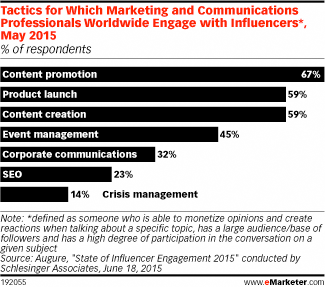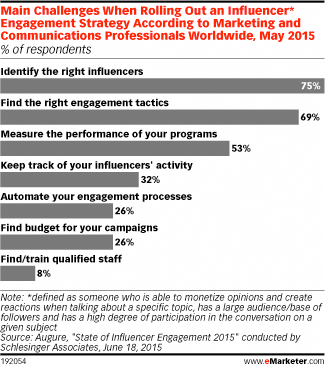Marketers Pair Up with Influencers—and It Works
July 10, 2015
![]() Teva, ShopStyle and Dr. Pepper are recent examples of brands and companies leveraging influencers to drive engagement and awareness, and usage isn’t slowing. In a May 2015 study by Schlesinger Associates for Augure, 84% of marketing and communications professionals worldwide expected to launch at least one campaign involving an influencer in the next 12 months. Those who had already done so were happy with the results: 81% said influencer engagement was effective.
Teva, ShopStyle and Dr. Pepper are recent examples of brands and companies leveraging influencers to drive engagement and awareness, and usage isn’t slowing. In a May 2015 study by Schlesinger Associates for Augure, 84% of marketing and communications professionals worldwide expected to launch at least one campaign involving an influencer in the next 12 months. Those who had already done so were happy with the results: 81% said influencer engagement was effective.
 Content was a driving force of influencer campaigns. More than two-thirds of marketing and communications professionals cited content promotion as a tactic for which they engaged with influencers—the No. 1 response—and nearly six in 10 said the same about content creation. This put content creation in second place alongside product launches, which fell from the No. 1 spot they grabbed in 2014.
Content was a driving force of influencer campaigns. More than two-thirds of marketing and communications professionals cited content promotion as a tactic for which they engaged with influencers—the No. 1 response—and nearly six in 10 said the same about content creation. This put content creation in second place alongside product launches, which fell from the No. 1 spot they grabbed in 2014.
Identifying the right influencers was the biggest challenge when rolling out an influencer engagement strategy, cited by 75%. Respondents also struggled to get influencers’ attention and to measure efforts.
 Professional bloggers polled worldwide in May 2015 by GroupHigh gave some insight into influencers’ attitudes toward such partnerships, some of which may help marketers address challenges. For one, when asked which metrics marketers cared about when determining which influencers to work with, respondents said social profiles and data were the most important, at 87% of respondents. Verified traffic data followed, at three-quarters, and demographics rounded out the top three, cited by 50%.
Professional bloggers polled worldwide in May 2015 by GroupHigh gave some insight into influencers’ attitudes toward such partnerships, some of which may help marketers address challenges. For one, when asked which metrics marketers cared about when determining which influencers to work with, respondents said social profiles and data were the most important, at 87% of respondents. Verified traffic data followed, at three-quarters, and demographics rounded out the top three, cited by 50%.
Responses indicated that brands weren’t necessarily reaching out to bloggers the way they wanted them to. Agencies representing brands were the most likely to contact bloggers, followed by third-party networks and then brands. However, bloggers overwhelmingly wanted to be contacted by the brands themselves, cited by 79% of respondents. In comparison, just 26% wanted to hear from agencies and 4% from third parties.
In terms of measurement, page views ranked as the most-used data point, cited by 85% of respondents. Engagement metrics were less important, with 60% of bloggers saying brands measured social shares and 40% citing comments.
Courtesy of eMarketer




























